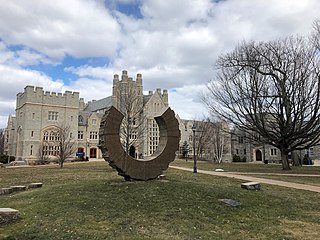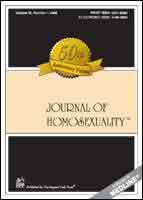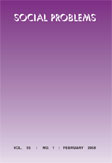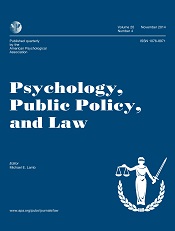
The following outline is provided as an overview of and topical guide to the discipline of sociology:

In Greek mythology the Horae or Horai or Hours were the goddesses of the seasons and the natural portions of time.
The Herfindahl index is a measure of the size of firms in relation to the industry they are in and is an indicator of the amount of competition among them. Named after economists Orris C. Herfindahl and Albert O. Hirschman, it is an economic concept widely applied in competition law, antitrust regulation, and technology management. HHI has continued to be used by antitrust authorities, primarily to evaluate and understand how mergers will affect their associated markets. HHI is calculated by squaring the market share of each competing firm in the industry—expressed as either fractions, decimals, or whole numbers—and then summing the resulting numbers. The result is proportional to the average market share, weighted by market share. As such, it can range from 0 to 1.0, moving from a huge number of very small firms to a single monopolistic producer. Increases in the HHI generally indicate a decrease in competition and an increase of market power, whereas decreases indicate the opposite. Alternatively, if whole percentages are used, the index ranges from 0 to 10,000 "points". For example, an index of .25 is the same as 2,500 points.

Juvenile delinquency, also known as juvenile offending, is the act of participating in unlawful behavior as a minor or individual younger than the statutory age of majority. In the United States of America, a juvenile delinquent is a person who commits a crime and is under a specific age. Most states specify a juvenile delinquent, or young offender, as an individual under 18 years of age while a few states have set the maximum age slightly different. In 2021, Michigan, New York, and Vermont raised the maximum age to under 19, and Vermont law was updated again in 2022 to include individuals under the age of 20. Only three states, Georgia, Texas, and Wisconsin still appropriate the age of a juvenile delinquent as someone under the age of 17. While the maximum age in some US states has increased, Japan has lowered the juvenile delinquent age from under 20 to under 18. This change occurred on April 1, 2022 when the Japanese Diet activated a law lowering the age of minor status in the country. Just as there are differences in the maximum age of a juvenile delinquent, the minimum age for a child to be considered capable of delinquency or the age of criminal responsibility varies considerably between the states. Some states that impose a minimum age have made recent amendments to raise the minimum age, but most states remain ambiguous on the minimum age for a child to be determined a juvenile delinquent. In 2021, North Carolina changed the minimum age from 6 years old to 10 years old while Connecticut moved from 7 to 10 and New York made an adjustment from 7 to 12. In some states the minimum age depends on the seriousness of the crime committed. Juvenile delinquents or juvenile offenders commit crimes ranging from status offenses such as, truancy, violating a curfew or underage drinking and smoking to more serious offenses categorized as property crimes, violent crimes, sexual offenses, and cybercrimes.

The University of Connecticut School of Law is the law school associated with the University of Connecticut and located in Hartford, Connecticut. It is the only public law school in Connecticut and one of only four in New England. In 2020 it enrolled 488 JD students.

A juvenile court, also known as young offender's court or children's court, is a tribunal having special authority to pass judgements for crimes that are committed by children who have not attained the age of majority. In most modern legal systems, children who commit a crime are treated differently from legal adults that have committed the same offense.

In criminal justice systems, a youth detention center, known as a juvenile detention center (JDC), juvenile detention, juvenile jail, juvenile hall, or more colloquially as juvie/juvy, also sometimes referred as observation home or remand home is a prison for people under the age of majority, to which they have been sentenced and committed for a period of time, or detained on a short-term basis while awaiting trial or placement in a long-term care program. Juveniles go through a separate court system, the juvenile court, which sentences or commits juveniles to a certain program or facility.

Donald Lee Hollowell was an American civil rights attorney during the Civil Rights Movement, in the state of Georgia. He successfully sued to integrate Atlanta's public schools, Georgia colleges, universities and public transit, freed Martin Luther King Jr. from prison, and mentored civil rights attorneys. The first black regional director of a federal agency, Hollowell is best remembered for his instrumental role in winning the desegregation of the University of Georgia in 1961. He is the subject of a 2010 documentary film, Donald L. Hollowell: Foot Soldier for Equal Justice.

The Journal of Homosexuality is a peer-reviewed academic journal covering research into sexual practices and gender roles in their cultural, historical, interpersonal, and modern social contexts.

The Corruption Perceptions Index (CPI) is an index which ranks countries "by their perceived levels of public sector corruption, as determined by expert assessments and opinion surveys." The CPI generally defines corruption as an "abuse of entrusted power for private gain". The index is published annually by the non-governmental organisation Transparency International since 1995.

Social Problems is the official publication of the Society for the Study of Social Problems. Social Problems are universal in nature, but their intensity and type change from society to society. Social problems are socially relative. It is a quarterly peer-reviewed journal published by Oxford University Press since 2015 and formerly published by University of California Press. It was established in 1953. Some of the areas covered by the journal include: conflict, social action, and change; crime and juvenile delinquency; drinking and drugs; health, health policy, and health services; mental health; poverty, class, and inequality; racial and ethnic minorities; sexual behavior, politics, and communities; and youth, aging, and the life course. The journal is co-edited by Annulla Linders and Earl Wright II.
The Connecticut Law Review is a quarterly law review produced by students of the University of Connecticut School of Law. It publishes more than 1,000 pages of critical legal discussion each year and is managed entirely by a student board of editors. The journal was established in 1968.

The Journal of the History of Sexuality is a peer-reviewed academic journal established in 1990 and published by the University of Texas Press.

Psychology, Public Policy, and Law is a quarterly peer-reviewed academic journal published by the American Psychological Association. It publishes original empirical papers, reviews, and meta-analyses on the contribution of psychological science to law and public policy.

Oscar Hallam was an American lawyer, judge, and academic from Minnesota. He served as a justice of the Minnesota Supreme Court from 1912 to 1924, and served as a Minnesota state Second District Court judge from 1905 to 1912. Hallam was a member of the faculty (1901–1945), dean (1919–1941) and president until 1945, of William Mitchell College of Law.
The Journal of Sexual Aggression is a peer-reviewed academic journal It provides an international and interdisciplinary forum for the dissemination of original research findings, reviews, theory, and practice developments regarding sexual aggression in all its forms. The Journal aims to engage readers from a wide range of research, practice and policy areas, including prevention science, crime science, public health, law and regulation, policing and investigation, prosecution and sentencing, corrections and youth justice, child protection, victim advocacy and support, clinical and risk assessment, and offender treatment and risk management. The Journal recognises that human sexual aggression is a global problem, and therefore includes high quality contributions, written in English, from around the world. It is the official journal of the National Organisation for the Treatment of Abusers (NOTA). The Editor-in-Chief of the journal as of 2021 is Dr Nadine McKillop.

Youth Violence and Juvenile Justice is a quarterly peer-reviewed academic journal that covers the field of criminology and juvenile law. Its Co-editors are Chad R. Trulson and Jonathan W. Caudill. It was established in 2003 and is currently published by SAGE Publications.
The American Journal of Orthopsychiatry is a bimonthly peer-reviewed medical journal covering orthopsychiatry. It is published by the American Psychological Association on behalf of the Global Alliance for Behavioral Health and Social Justice and the editors-in-chief are Jill D. McLeigh and William Spaulding.
The Canadian Journal of Criminology and Criminal Justice is a quarterly peer-reviewed academic journal covering the theoretical and scientific aspects of the study of crime and the practical problems of law enforcement, administration of justice and the treatment of offenders, particularly in the Canadian context. It is published by the University of Toronto Press.














